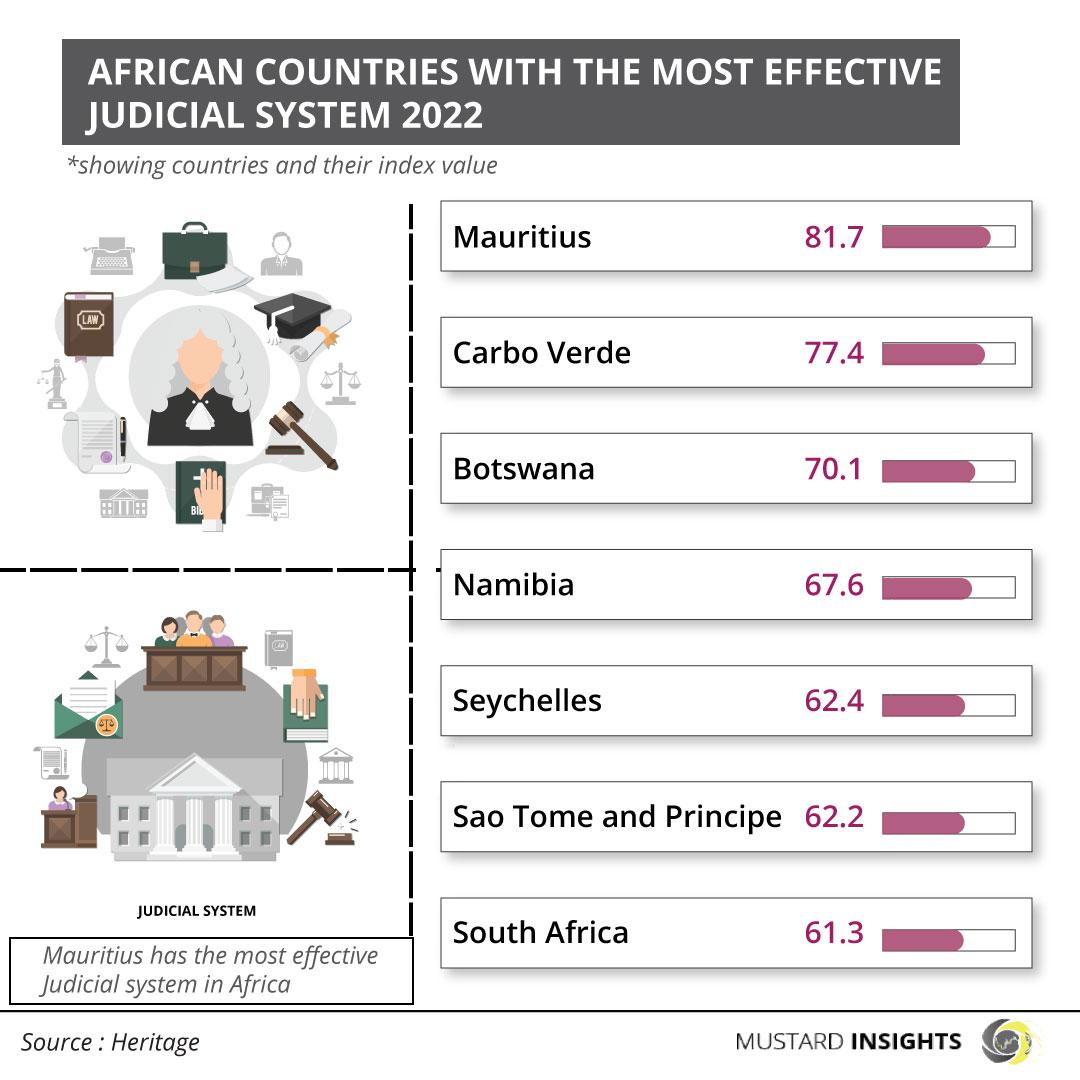Seven (7) Countries have been ranked with the most-effective judiciary system in Africa. The ranking was premised on the rule of law, independence of the Judiciary, separation of powers, timeframe for the resolution of disputes, the manner of judicial interpretations and and the availability of judicial officers.

The Judiciary is the third body of government and is often referred to by many as the most critical arm of any progressive government. Next to the Executive and Legislature arms, the Judiciary mainly interprets the laws of any given state and adjudicates upon cases accordingly in times of breach. The Judges and courts make up the Judiciary in any functional state.
Before colonialism, Africans had practised law for centuries before theorising it. The legal systems in African countries are uniquely diverse. They have their foundations in different colonial heritages and have been shaped by a great variety of customary and religious norms, which affects the design of each country's judicial system.
Mauritius, Carbo Verde, Botswana, Namibia, Seychelles, Sao Tome and Principe, and South Africa, have all been ranked as the countries with the most-effective judicial system in Africa.
The ranking was premised on the rule of law, independence of the Judiciary, separation of powers, timeframe for the resolution of disputes, the manner of judicial interpretations and and the availability of judicial officers.
1. Mauritius (81.7)
With its colonial French and English heritage, Mauritius inherited a hybrid system from its colonial masters with various sources of law, including England and France, in addition to legislation and regulations passed by the Mauritian Parliament and various Supreme Court rulings. The Mauritian legislature and Supreme Court judgements still reflect English legislation, binding precedents, and doctrine, as well as the French Cour de cassation and doctrine, especially in civil matters. The Constitution of 1968 is the supreme law of the land in a country with its own Rules of Law (la règle du droit).
Decisions reached by superior courts (Supreme Court, Court of Civil Appeal, Court of Criminal Appeal, and the Judicial Committee of the Privy Council) are binding over inferior and subordinate courts (District Courts, Fair and Rent Tribunal, Bail and Remand Court, Children Court, Juvenile Court, Environment Tribunal, Court of Rodrigues, Industrial Court, Reviewing Authority, Intermediate Court, Court of Assizes) with regular sittings throughout the year with such number of Magistrates in either civil or criminal cases but there may be a change in venue (section 102 Courts Act 1945) from District Court to another District Court or Intermediate Court (for security reasons or if an action has been wrongly lodged) or challenge of a Magistrate (section 125 Courts Act 1945) to avoid any decision to be biased.
Mauritius scored an index of 81.7 and ranked the country with the best Judicial System in Africa.
2. Carbo Verde (77.4)
Carbo Verde is one of the smallest African countries with a group of islands in the Atlantic Ocean. Like many other African countries, Carbo Verde derives the source of its law from its colonial masters. Before its independence, Cape Verde was subject to the Portuguese civil and criminal codes. Today, they make use of the 1980 (rev. 1992) Constitution. The 1992 Constitution provides for an independent judiciary, and the government generally respects this provision in practice. The Constitution provides for the right to a fair trial and due process, and an independent judiciary usually enforces this right. The Supreme Tribunal (Court) of Justice has a minimum of five members, one appointed by the President, one appointed by the National Assembly, and three appointed by the Supreme Council of Magistrates. The Ministry of Justice and Labor appoints local judges.
The country ranked second on the list scoring an index of 77.4.
3. Botswana (70.1)
Botswana has a dual legal system, which comprises of the Roman–Dutch Law and its Customary Law., Botswana had both foreign inhabitants living side by side with the indigenous people of the country, hence the reason for the adaptation of this system. The legal system comprises of The High Court of Botswana, which is located at Lobatse with a branch at Francistown. There are magistrates' courts in each district. Appeals are made to the Court of Appeal of Botswana.
The Chief Justice and the President of the Court of Appeal are appointed by the President, while other judicial appointments, though made by the President, are on the recommendations of the Judicial Service Commission. Customary law cases are heard by village assemblies or kgotla, which are open to all. The traditional chiefs act as court presidents. There is also a customary court of appeal.
Botswana scored an index score of 70.1 putting the country as the third country on the list.
4. Namibia (67.6)
Prior to the attainment of its independence, the courts of Namibia were an extension of the judicial system of South Africa. Its Constitution was adopted on February 9 1990. Its legal system consists of the Labour Court, which belongs to the Superior Courts of Namibia, which is established under section 15 of the Labour Act, 1992 (No. 6 of 1992), and the Supreme Court, established by Article 79(1) of the Constitution provides that the Supreme Court should consist of a Chief Justice and such additional Judges as the President, acting on the recommendation of the Judicial Service Commission, while Article 79(2) adds that the Supreme Court is to be presided over by the Chief Justice, The High Court, and the Lower Courts which are established under Article 78(1) of the Namibian Constitution.
Namibia is fourth on the list scoring an index of 67.6.
5. Seychelles (62.2)
Originally, Seychelles was a French colony before acceding to the British. Hence the reason why Seychelles has a unique mixed jurisdiction legal system. The civil law is governed by a Civil Code derived from the French Napoleonic Code, while the criminal law is substantially based on the British criminal law. Procedural law is primarily British-based.
The magistrates' courts are the courts of first instance for cases under civil and criminal codes. The most serious civil and criminal cases, and appeals from the magistrates' courts, come before the Supreme Court. The Constitutional Court is a division of the Supreme Court and deals with human rights as well as constitutional matters. The Court hears appeals from the Supreme Court of Appeal. Other courts include the Family Tribunal, Rent Control Board and employment tribunals. Judges are generally recruited from other Commonwealth countries and employed on contracts. The chief justice and other judges are appointed by the President of the republic, and the other judges are in consultation with the chief justice.
The legal system operates on the 1993 (2017 rev) Constitution and was listed as the country with the fifth most effective judicial system in Africa, with an index score of 62.4.
6. Sao Tome and Principe (62.2)
Sao Tome and Principe is the smallest African country colonised by the Portuguese for five centuries. They operate a legal system called civil law tradition. It is grounded on Sao Tome customary laws and fundamentally Portuguese formal civil law based on the Napoleonic Code of 1804 and codified regulations. After its independence, Decree-law 26/79, dated May 16, created the Organic Law on Justice Ministry that included the draft of the Santomean judiciary institutions. Its Judicial branches include the Supreme Court or Supremo Tribunal Justica; Constitutional Court or Tribunal Constitucional, Court of First Instance and Audit Court.
Sao Tome and Principe ranked sixth on the list, scoring an index of 62.2.
7. South Africa (61.3)
South Africa's judicial system runs on common law based on Roman-Dutch Law. Section 166 of the Constitution of the Republic which deals with the Judicial System establishes the following courts: the Constitutional Court; the Supreme Court of Appeal; the High Courts, including any high court of appeal that may be established by an Act of Parliament to hear appeals from High Courts; the Magistrates' Courts; and any other court established or recognised in terms of an Act of Parliament, including any court of a status similar to either the High Courts or the Magistrates' Courts.
As declared by the Superior Courts Act, the Chief Justice exercises responsibility over all Superior Courts including the Constitutional Court, Supreme Court of Appeal, the High Court and any court of a status similar to the High Court.
South Africa was seventh on the list scoring an index of 61.3.
Thoughts?
We won't share your email address. All fields are required.
